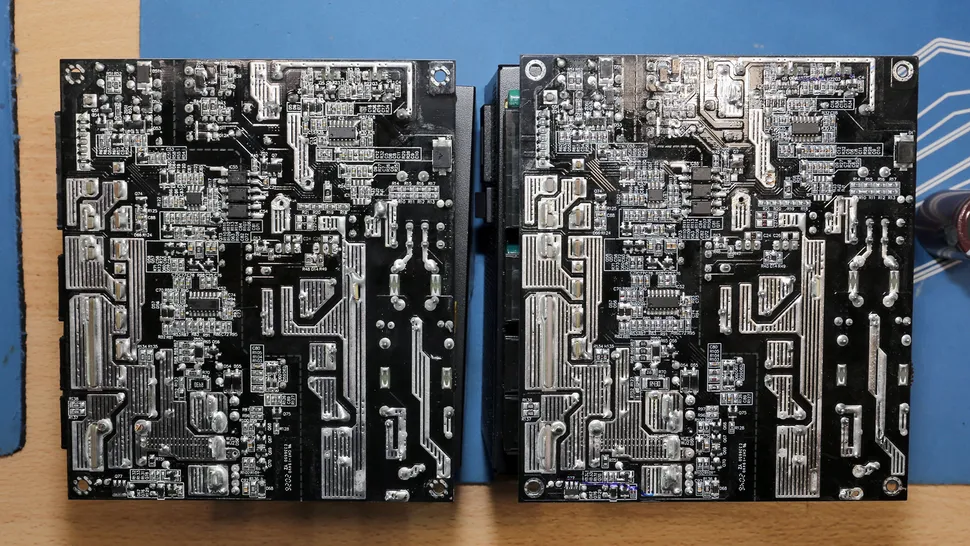- Feb 26, 2006
- 66,573
- 14,973
- 146
I don't know who makes these PSU's for Gigabyte, but I'd think Gigabyte would be on the hook for damages caused by these "exploding" power supplies.
Of course, I sent Gigabyte an email with all of my findings and spoke to the power R&D supervisor, who informed me that they checked five samples which all survived their OPP evaluation test. What left a negative impression on me was that they didn't bother asking for my sample to be sent back to check on what went wrong. With such a colossal failure on hand, the respective brand usually immediately asks for the sample to be returned for a closer examination to find the source of the problem. You might test dozens of samples at the factory, and while all of those pass the tests, what matters the most is finding those with an actual problem for a thorough examination in an attempt to figure out why they broke down.
I don't know who makes these PSU's for Gigabyte, but I'd think Gigabyte would be on the hook for damages caused by these "exploding" power supplies.
Gigabyte was pretty much my go to for motherboards ever since I began building my own back in the 90s (as well as Asus).I've never heard anything good about any Gigabyte product except their motherboards...and that's why I've never bought one of those either. If poor to mediocre quality is OK with the company for the other categories...why not in their mobo lineup?
Gigabyte was pretty much my go to for motherboards ever since I began building my own back in the 90s (as well as Asus).
That changed around 2015 when I built my son's previous computer. I ordered a pretty mid-range Gigabyte H97 motherboard. Once it arrived, I preceded to spend days swapping components in and out because of issues. I eventually replaced everything with pulled components from other computers, and it still was crashing.
I sent the motherboard back to Amazon, and they sent a replacement. It was the exact same problem. I then Googled the Gigabyte model number, and found there was an abhorrently high number of people on various forums who had serious issues with that particular motherboard, and it really seemed like that particular model had a serious design flaw, and it really should have been recalled by Gigabyte. It was a particular model that a lot of people initially used to build "Hackintosh" computers over on the TonyMac86x forums, but many eventually gave up and replaced it with a different model.
I then ordered an Asus motherboard instead, and returned the 2nd Gigabyte. It worked flawlessly the 1st time. All companies have a dud every now and then, but to me it seems like Gigabyte simply looks the other way and continues to sell components that really should be recalled.
According to the report, attackers stole as much as 112GB of confidential data, which includes motherboard designs, sensitive encryption keys, UEFI BIOS versions for yet-unreleased products, TPM data, and much more. Gigabyte is now in danger of all of this information making its way to the public domain. To keep that from happening, the hackers are requesting a ransom, as they're threatening to leak the data to the public and compromise Gigabyte.
Mpitziopoulos concluded that the OPP and OCP at 12V protections were set too high and the questionable FETs simply couldn't deal with the load. Even with his years of experience in the field, the GP-P750GM utilized parts from brands that Mpitziopoulos had never heard about, which make us doubt the quality of the components.
Gigabyte's solution consists in lowering the OPP trigger point for the GP-P850GM and GP-P750GM. The manufactuer reduced the threshold from 120% to 150% down to 110% and 120% for both units. In its statement, Gigabyte reaffirms that "the potential issues that were reported, only seemed to occur after very long time periods of extreme load testing via DC Electronic load equipment and would not be typical of any real world usage."
Sounds like the brand is just coasting off their reputation at this point. Such a shame really.They make not-so-great RTX 3090 cards, so I hear. If used for mining, the Gigabyte cards are manditory to replace the (poor-quality) factory thermal pads, so that your card doesn't burn up the VRAM.
only seemed to occur after very long time periods of extreme load testing via DC Electronic load equipment and would not be typical of any real world usage."
This problem is not exclusive to the Gigabyte brand. When used for mining 24/7, most 3090s need some kind of tweaks. Out of the box, EVGA/ASUS/PALIT seem to be the best in this department, though. It sucks to see your hashrate going down because of memory throttling. 3060 Ti's are better for mining, imoThey make not-so-great RTX 3090 cards, so I hear. If used for mining, the Gigabyte cards are mandatory to replace the (poor-quality) factory thermal pads, so that your card doesn't burn up the VRAM.

The PSU having evidently failed to light a big enough fire under Gigabyte's butt, on its own. The bad press fanning the flames did the trick. They fixed the issue, in the latest version -

On the left is the old platform and on the right is the new one. The difference in design is located near the LLC resonant controller. The resistance of R94 has decreased, and the layout is also different. R94 is connected to the ILIM pin of the CM6901 controller, which is responsible for OPP's triggering point. If MEIC just wanted to lower OPP, there was no reason to change the layout in this area. A simple resistor replacement would do. Apparently, the company needed to tweak the design, so it decided to change the PCB.


